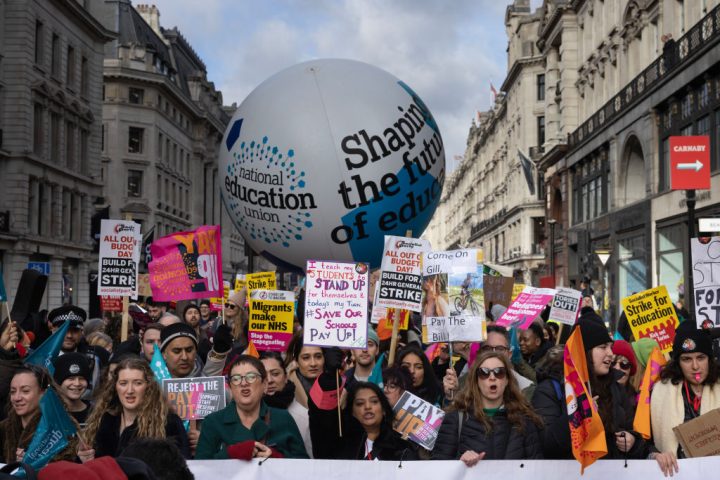Here we go again. It’s term time but millions of kids across the country are being denied school as the National Education Union (NEU) has called its members out on strike once more.
Forget the fact that children have already had three years of their education disrupted by Covid. Ignore the minor issue of school attendance being through the floor and that the average secondary school student on course to miss the equivalent of an entire month of lessons this year.
Teachers can get their pay rises backdated; kids can never get back the time they’ve missed from school
Following a national strike on 1 February and regional ones a fortnight ago, this week sees two more full days of school closures, complete with the marches, rallies and carnivalesque paraphernalia that unions seem to love so much. Yet one can’t help but wonder why the NEU is still pursuing this action when so many other unions have paused theirs to start negotiations about settlements.
Teacher strikes are the wrong move for the wrong reason at the wrong time, and this is even more the case now than ever. They are the wrong move because they’re so divisive. The NEU was the only one out of the three unions balloting for action who actually voted in favour of striking – even then, fewer than half of its members actually backed strikes.
Since then, we’ve seen staffrooms split and those left in school run ragged trying to keep the show on the road. At a time when we should all be pulling together, it’s a tragedy.
Teachers are striking for the wrong reason too. While pay for many has indeed fallen in real terms since 2010, overall teachers remain extremely well rewarded relative to most people, especially when you add on an extra 24 per cent of their salary towards the generous pension scheme they have. Those in the private sector earning far less, with just a basic pension, and who weren’t paid in full while at home during the lockdowns could be forgiven for looking on and thinking strikers are out-of-touch with reality.
Above all, now is the worst time to strike. Attendance in schools has plummeted, with nearly a quarter of all students ‘persistently absent’ and missing more than 10 per cent of school hours. The most important thing teachers can do right now to improve pupils’ prospects is to have them in school and learning – strikes do the exact opposite of this.
This is not to mention that striking destroys any credibility a teacher might have in challenging absences too: you can’t insist with a straight face that a kid comes to school if you’ve just taken action to close that very same school. What a mess.
That said, it does feel as though we might be inching towards an end to the dispute.
The mood music from the government has changed; other striking public sectors have started talks to address their issues. The Department for Education has also made it clear that pay and other matters are now on the table for discussion. You’ve got to wonder why the NEU has persisted with strikes, refusing to call them off even if they do come to the negotiating table. Other teaching unions have said that they feel able to get stuck into substantive talks and hinted at frustration with the NEU’s refusal to engage.
We must hope that things are resolved sooner rather than later. This has not been the most edifying conflict to observe and while it might end up being good for teachers’ pay, it won’t have done much for the profession’s reputation.
There is also a good chance it will make the recruitment challenges that schools face even worse: telling the world for months and months how awful your job is will hardly encourage others to choose it for themselves.
However this ends for the strikers, this has, without a doubt, been most damaging for the people who should matter most: the pupils. Teachers can get their pay rises backdated; kids can never get back the time they’ve missed from school.
So when you see people jubilantly marching today or cheering a big pay rise in the near future, remember that the cost isn’t just the financial one borne by the tax payer. It is also the one imposed on kids who can least afford it. I’m not sure that is worth celebrating.






Comments